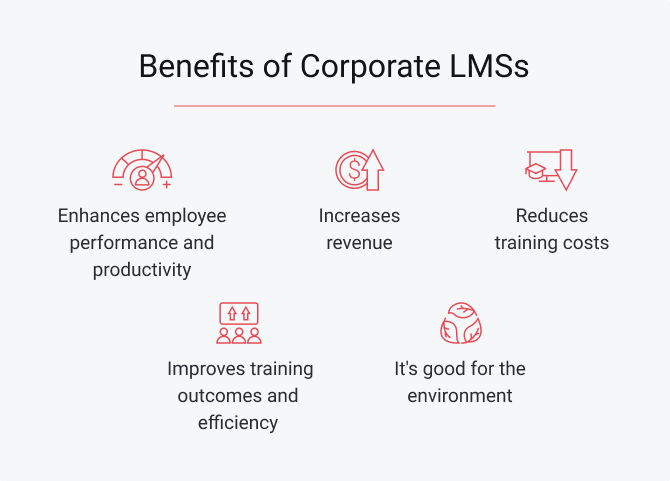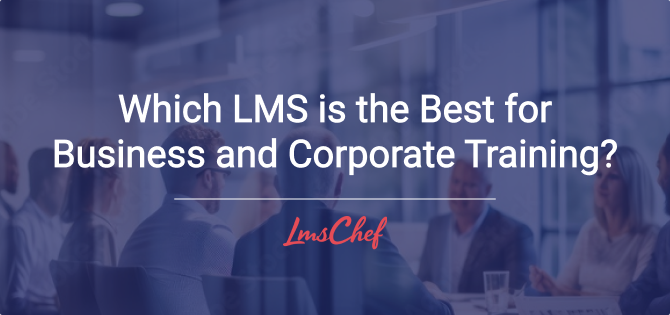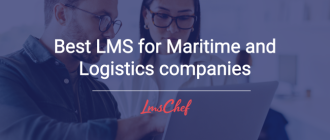More than 40% of the world’s Fortune 500 companies use eLearning to train employees. And this figure looks set to increase as the eLearning industry continues to skyrocket.
But why? What advantages does an LMS for businesses bring to the table?
One study showed that 72% of organizations believe that eLearning enables them to keep up with market changes, increasing their competitive edge.
And that’s just the tip of the iceberg.
Implementing a robust LMS platform for a company can enhance employee performance, create a seamless onboarding experience, and ensure that sensitive data is protected.
Are you considering investing in a learning solution but aren’t sure where to start? This guide covers everything your organization needs to know about choosing a learning management system for corporate training in 2024. That includes:
- Why it’s important for business
- 5 benefits of implementing one (with stats)
- Different types of learning platforms for corporate training
- Key features
- The five top LMS tools for business
First up: Why does your business need a learning management system?
Why Is an LMS Important for Your Business?
Before we delve into the benefits of an LMS for corporate training, let’s start with the business case.
Why allocate a budget for a top LMS platform for business? What’s in it for your organization?
A corporate learning management system facilitates employee, customer, and partner training at scale.
That way, you have a centralized, single source of truth for all training initiatives in your organization. This ensures consistency and makes it easier to manage and update learning materials.
Here are some of the other key reasons an LMS is essential for your organization.
- Facilitates remote learning, as it allows you to train employees across multiple locations and expand your talent pool.
- Ensures a seamless employee onboarding process by providing 100% online personalized learning pathways for different roles and levels of seniority.
- Is a convenient and accessible platform that staff can access from any device at any time.
- Is a cost-effective and expedient approach to corporate training.
- Standardizes employee training across your organization.
- Offers high levels of customization in terms of learner experience, mirroring your organizational structure, and assigning admin roles.
- Integrates with other corporate systems to consolidate training data and provide a great user experience.
- Enables your organization to manage regulatory compliance training (many top LMSs have security measures like single sign-on to protect sensitive data).
- Provides detailed analytics and reporting capabilities to track employee performance, training ROI, and learning activities.
These are just some of the reasons why a learning management system for business is an essential tool for your organization.
In a nutshell, the right system will streamline employee education initiatives, reduce your L&D team’s workload, and future-proof training in your company.
Now let’s take a closer look at the top benefits of an LMS for corporate training.
Benefits of Using a Corporate LMS

We’ve briefly mentioned the advantages that LMS systems for business can offer. Now, let’s look at the data.
We’ve compiled some key statistics on how a corporate learning management system can benefit your company operations directly.
1. Enhances employee performance and productivity
The right LMS software for business can empower your employees and boost on-the-job performance.
For starters, a learning platform allows staff to learn in a flexible environment and at a speed that suits them.
Research shows that when employees learn at their own pace, their performance can increase by 15 to 25%.
The same goes for employee productivity.
A fascinating study conducted by IBM revealed that for every dollar that companies invest in online training, they realize an ROI of $30 in productivity. The reason for this is that employees can complete training faster and apply the new skills right away. In areas such as sales, this is a huge boon.
As we all know, engaged employees generate better results. Therefore, investing in employee engagement can have a direct impact on productivity and workplace performance.
A study by the Molly Fletcher Company showed that eLearning technology, such as an LMS, can help boost employee engagement by as much as 18%.
Adopting a corporate LMS platform can also improve efficiency when it comes to customer training. Providing high-quality online customer education courses and delivering them via a learning management system can significantly reduce the number of support requests your team receives. And, at the same time, it improves the customer experience.
Find out how Italian company Tattile reduced its support team’s workload by 30% using iSpring.
These figures highlight just how much an LMS for business can impact workplace performance and productivity.
2. Increases revenue
Investing in employee training may seem like a large expense. But when done right, it can provide a huge payoff.
The best LMS systems for corporate training facilitate knowledge sharing within your business, making regular training accessible to the entire workforce.
As a result, this knowledge translates into increased revenue.
The data shows that when employers invest $1,500 per employee in training (annually), they realize a 24% increase in profit.
Additionally, for every additional $680 that companies spend, shareholder returns increase by a further 6%.
Other research indicates that the average revenue generated per employee is 26% higher in companies that offer eLearning.
Indeed, a study by the American Society for Training and Development revealed that organizations that offer a comprehensive training program had a 218% increase in revenue and 24% higher profit margins.
These statistics highlight the direct correlation between the amount an organization spends on training and its bottom line.
3. Reduces training costs
Continuing from the point made above, learning management software for business can also serve to cut training costs.
We don’t need to remind you that traditional in-classroom training programs are expensive. Travel expenses, venue fees, accommodations, refreshments, instructor costs… it all adds up.
Moving training online dramatically reduces many of these costs. Of course, there’s an initial investment, but once your program is up and running, training expenses drop significantly.
IBM states that it saved an estimated $200 by switching its training to an eLearning model.
Many of our clients have reported the same outcomes.
For example, since implementing iSpring Suite (authoring tool and corporate LMS), Pakistan’s leading 4G operator and the largest internet and broadband service provider, Jazz, is now saving 30% on training costs and providing employee education to five times more people.
Another one of our clients, Triad Unlimited, has saved its clients over $200, 000 USD by moving training online with iSpring.
By adopting an online customer training model, this asset management solutions organization saved $2,000 USD a week on travel expenses alone. Moreover, it was able to offer a more flexible and consistent learning experience.
In short, a robust employee training LMS for corporations can slash the cost of staff education while improving outcomes.
4. Improves training outcomes and efficiency
Despite ample data, many organizations still underestimate the efficiency and effectiveness of online corporate training.
Perhaps it’s because we often focus on the cost-savings and flexibility of an LMS for business training.
Nevertheless, the best LMS platforms for business can also greatly improve knowledge retention and training efficiency. Let’s examine some relevant data.
A Brandon-Hall study shows that eLearning takes 40 to 60% less learning time than in-classroom training.
At the same time, it boosts knowledge retention by as much as 60%, according to the Research Institute of America.
When we compare this to the retention rates for in-person training (8 to 10%), it’s clear that learners retain much more information when they can control the learning process, as in the case of eLearning.
The IBM statistics confirm this. After introducing its eLearning employee training program, IBM discovered that staff learned almost five times more material without increasing training time.
This meant that IBM could reduce the amount of time employees spend on training and get them back to work (to apply those skills) faster.
eLearning allows L&D teams to present training materials in bite-sized chunks, making it easier for employees to understand and retain key concepts.
Thanks to microlearning and mobile learning, learners can get vital information more efficiently and get back to work faster.
Deloitte estimates that the average worker needs to dedicate around 1% of their time per week to training if they want to stay up-to-date with industry best practices. This works out to around 24 minutes a week, or 4.8 minutes a day if your staff members work a five-day week.
While this would be hard to achieve through traditional in-classroom training sessions, eLearning makes it viable. Workers can take a five-minute microlearning module every day to keep their knowledge fresh and stay on top of new developments.
5. It’s good for the environment
Classroom training typically involves travel and paper handouts, both of which are damaging to the planet.
eLearning, on the other hand, offers a greener training solution.
A study by the Open University in the UK revealed that eLearning courses consume around 90% less energy and 85% fewer CO2 emissions per learner than face-to-face sessions.
So, if your business wants to go green and meet your CSR goals, an LMS for corporate training could be the solution.
Next on the agenda, we look at the most common types of learning management systems for businesses.
Types of Corporate LMSs
There are two main choices you need to make when choosing a corporate LMS.
First, you’ll need to decide between open-source and commercial software. Second, you’ll have to choose either locally hosted software or a cloud-based SaaS solution.
Here’s a brief rundown of each option:
Open-source vs. Commercial LMSs
Using an open-source system means you don’t need to purchase a license, and you can customize the learning management software to your needs, thanks to open code. As such, this is a great option for non-profit organizations or companies with a limited budget.
However, your organization needs to have an IT technician to install and maintain this type of LMS, and this can consume both valuable time and resources.
Commercial LMS systems are proprietary training software and come with a license fee. This type of solution is managed by a corporate vendor and can be either cloud-based or installed on-site.
The main advantage of this type of platform is that the vendor will offer ongoing tech support and training, and will manage all software updates.
Locally hosted vs. Cloud-based LMSs
As the name suggests, your company’s IT team will need to set up and maintain a locally hosted learning system. This often requires high setup fees and a large investment of time and resources to keep the software running properly.
On the other hand, a cloud-based LMS offers a more flexible option. This type of software is hosted on the web by the vendor, so learners can access it anywhere and on any device.
The biggest advantage is that your organization doesn’t need to dedicate extensive IT resources to maintain it. It also ensures that your data is safeguarded with stringent encryption protocols.
Key LMS Features That Are Important for Business
It’s easy to get distracted by all the bells and whistles that many eLearning platforms offer. But what you actually need is a handful of essential features that will ensure your LMS delivers top results for the business.
While the precise features you require will depend on your organization and goals, there are some fundamentals that every company needs. We’ve categorized them into the essentials and the ‘nice to haves.’
| Essential Features | ‘Nice to Have’ Features |
| Custom user management roles so you can easily add users and assign them to different roles, departments, and groups. | A mobile app that allows staff to train from any location and device (bonus points if it supports offline learning). |
| Robust reporting and tracking capabilities to measure training ROI and learning performance. | Personalized learning paths to provide staff with tailored training that matches their knowledge level, role, and seniority. |
| Rich course management features that allow you to upload, manage, and deploy training materials to your audience with ease. | Gamification to motivate employees to complete training courses. |
| An intuitive interface that makes it simple for learners to use the platform and for admins to manage it. | Social learning tools such as ‘Ask the Expert’ and content sharing to promote collaborative learning. |
| Integrations with key tools in your tech stack, such as video conferencing, HR, and course authoring software. | White labeling, so you can apply your branding on the platform (this is essential if you plan to offer customer training). |
| Certifications, so you can award employees for completing training courses or learning paths. |
Now let’s take a look at the 5 best LMS software for business.
List of the 5 Best LMSs for Corporate Training
So, which is the best LMS for business?
The answer to this question depends on what your company wants to achieve through its training initiatives. Other factors, such as budget, organizational size, and current resources, also play a large part.
Taking all this into consideration, we’ve rounded up five of the best learning management systems for business in 2024.
1. TalentLms
TalentLMS offers a user-friendly and scalable solution for large enterprises.
Overview
TalentLMS is an affordable cloud-based platform that is simple to use and robust enough to grow with your business.
With a nice list of integrations and plenty of customization tools, it’s a great choice for businesses of all sizes.
Key features
Talent LMS has some interesting features that work well for corporate training programs. Here are some of the most notable ones:
- An integrated course builder that allows you to create courses, add assessments, and host live sessions.
- User management features that enable admins to organize training courses, assign custom user roles to staff, and mimic the hierarchy in your business.
- Strong customization tools that allow you to build a totally branded training homepage and localize the platform in over 30 languages.
- A mobile app to facilitate anywhere, anytime learning.
- Engagement tools like gamification features, discussions, and feedback channels.
- Custom reporting options to closely monitor all training activities in the organization.
- Automatic awarding of certificates to learners for completing courses.
- Integrations with CRMs, video conferencing software, and HR platforms.
- A built-in content marketplace called TalentLibrary™.
Pricing: From $69/month (billed yearly)
Free trial available? Yes. TalentLMS offers a forever-free plan for up to five users and ten courses.
Ratings: TalentLMS scores 4.7 out of 5 stars on Capterra.
2. iSpring Learn
iSpring Learn is a leading employee training software for businesses of all sizes.
Overview
iSpring Learn is a cloud-based employee training platform that allows you to create, manage, deliver, and monitor staff education.
It’s simple enough for even the biggest technophobes to use, yet powerful enough to meet your toughest business needs.
Key features
iSpring Learn offers tools to facilitate employee upskilling and streamline workflows within your organization. Some of the standout features include:
- In-depth reporting capabilities for tracking employee performance at a granular level and easily visualize data with the user-friendly analytics dashboard.
- User management features that enable admins to organize training courses, assign custom user roles to staff, and set up personalized learning paths.
- Integrations with essential corporate tools, such as CRMs, HRIS, video conferencing software, calendars, and the award-winning iSpring Suite eLearning authoring tool.
- Automated progress reports, notifications, deadlines, and smart groups to reduce training management tasks for L&D teams.
- Custom admin roles, user profiles, and supervisor dashboards to lighten workloads and give all stakeholders access to performance metrics.
- Social learning tools like newsfeeds, chats with trainers, and leaderboards to engage employees in the learning process.
- A mobile app with offline learning capabilities.
- Advanced certificate management features so learners receive their certification automatically when they complete training.
iSpring also offers world-class, 24/7 customer support so your business can get fast answers to your queries, no matter where you are in the world.
Compared to other corporate training LMSs on this list, it offers unbeatable value for money.
Pricing: From $2.87/user/month
Free trial available? Yes. 30 Days
Ratings: iSpring Learn scores 4.7 out of 5 stars on Capterra.
3. Absorb
Absorb LMS is a popular AI-powered platform for large enterprises.
Overview
Absorb is a highly customizable enterprise LMS that is ideal for employee and partner training as well as customer education programs.
It boasts advanced reporting capabilities, which are ideal for large companies that need to collect comprehensive learning data. Despite its advanced features, Absorb LMS is user-friendly for both admins and learners.
Key features
Absorb LMS is an excellent option for businesses that want to offer both corporate training for employees and customer education. It provides a well-rounded list of features, including:
- Advanced reporting and analytics, including pre-built templates and custom reports so you can demonstrate training ROI and track learner progress.
- An intuitive mobile app that allows employees to learn from anywhere, including in the field.
- AI capabilities to automate training management tasks and reduce repetitive manual tasks.
- Turnkey LMS integrations with popular web services, apps, and content libraries.
- Observational checklists to streamline the process of verifying whether employees have the skills to perform their jobs and meet regulatory compliance.
- Custom user roles for learners, admins, and stakeholders, including a Reviewer role to sign off on checklists.
- An eSignatures feature so learners can sign to confirm they met important compliance requirements during training.
- Absorb Pinpoint, which uses AI to transcribe and timestamp video lessons so learners can easily search for them and find a specific point.
Absorb LMS has some unique features that can elevate training in your business. While it’s on the pricier side, it’s a well-rounded learning platform that’s simple to use.
Pricing: Available upon request.
Free trial available? Yes.
Ratings: Absorb scores 4.5 out of 5 stars on Capterra.
4. Docebo
Docebo is an AI-powered LMS with a wide range of functionalities for large businesses.
Overview
Docebo is a cloud-based LMS that’s best suited for organizations with over 300 learners, including employees, customers, and partners.
It’s designed to scale as your company grows, allowing you to extend training programs across several business units and languages.
Key features
Docebo offers a broad selection of tools so your business can tailor the platform to your needs, use cases, and organizational structure. Some of the highlights include:
- AI-based upskilling and reskilling tool (Docebo Skills) that creates personalized learning pathways for employees based on what they want to learn.
- Over 400 integrations with leading apps, content libraries, and corporate tools.
- Extended Enterprise allows you to manage multiple domains for internal and external audiences with custom admin roles, branding, privacy settings, and authentication.
- Free extensions, including certifications, e-commerce, custom domains, and audit trails so you can configure the platform for your use case.
- The Go.Learn mobile app publisher enables you to build apps for multiple domains and audiences.
- The Discover, Coach and Share tool promotes social learning, allowing employees to share training content, ask instructors questions, and give feedback on courses.
- Gamification features, including badges, points, and leaderboards to promote learning and motivate employees.
- Comprehensive reporting options that cover the main training metrics your business needs to gauge.
The Docebo LMS has some exciting features and add-ons that can help your organization roll out corporate training to a large audience.
Pricing: Available upon request.
Free trial available? Yes.
Ratings: Docebo scores 4.3 out of 5 stars on Capterra.
5. Moodle
Moodle LMS is an open-source learning management system for academic institutions and businesses alike.
Overview
Moodle is a free LMS for corporate training. Although it was originally designed for schools and higher education institutions, many businesses now use Moodle to deliver staff training.
Moodle is an open-source platform, which means that any company can download the software for free and customize the source code to suit their organization’s needs.
Key features
Moodle LMS comes with an impressive array of certified integrations, built-in features, and customization options. Here are some of the most notable features for businesses:
- Highly customizable, open-source platform.
- Offline access to both the LMS and the mobile app.
- Custom reports and analytics to track learners’ performance at both a macro and micro level.
- Automated email and mobile alerts to reduce L&D team workloads and ensure that learners never miss a deadline.
- Full ownership and control over the platform, including data privacy and security.
- 2,000+ open-source plug-ins and integrations available to personalize the learning management system and meet your learners’ needs.
- Social online learning experiences, such as forums, blogs, workshops, and Matrix Messaging to engage employees.
- Allows you to import or manually build competency frameworks for employees and assign learning plans at an individual or group level.
Moodle LMS is a stellar option if your business has the IT know-how and resources to set up and manage a learning platform. With unlimited customization options, you can tailor it to suit your unique business case.
Pricing: Free.
Ratings: Moodle scores 4.3 out of 5 stars on Capterra.
Over to You
The right LMS for business can drive revenue, enhance employee performance, and streamline training processes in your organization. All it takes is some careful research into the best solution for your company’s goals and needs.
We hope this guide facilitates your decision and helps you pick a solution that works for your organization.
Ready to join the 2,400+ teams using our LMS to grow their business? Get your 30-day free trial today.







